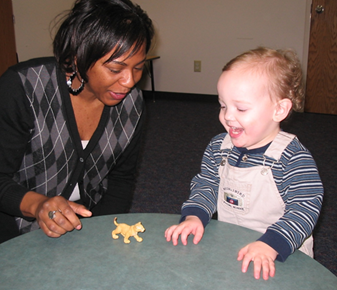UW Autism Center Launches New Programs
by Joel Schwarz

The STAT, a play-based measure, is used in the UW Autism Center's new early screening clinic.
With the number of children diagnosed with autism spectrum disorder (ASD) continuing to rise in Washington and the rest of the United States – a 2009 federal study indicates that one in 91 children will be diagnosed with the disorder – the University of Washington's Autism Center is increasing the variety of clinical services offered to families and service providers.
One of the key elements in this expansion by the UW Autism Center, which is part of the Center on Human Development and Disability (CHDD), was the launch of a new program in August to screen children at least 12 months old and under the age of two for early indications of autism. The program uses the Screening Tool for Autism in Toddlers (STAT), which was developed by Wendy Stone, Ph.D., the center's new director, to help parents who are concerned that their child may be showing signs of autism. The STAT is a play-based interactive assessment that allows clinicians to look at a child's social and communicative behavior, according to Stone, professor of psychology and a CHDD research affiliate.
Stone said that early screening clinics will be offered at both the UW Autism Center in Seattle and at its satellite facility on the UW Tacoma campus. She emphasized that the STAT is a screening tool and does not provide a formal diagnosis for ASD because it is difficult to make a diagnosis at such an early age. "Parents who have questions about autism often have to wait a long time before they can get an answer. The wait for a diagnosis can be up to a year, even for a two year-old child. It is very hard on parents because they are left wondering what they should be doing for their child in the meantime. By the time some children receive an autism diagnosis, they are no longer eligible for early intervention services. This early screening clinic can get a child on track sooner for autism treatment services, and can also give parents information and practical suggestions for specific goals and activities that they can use at home. For example, many children with autism have language delays. A child may like bubbles but just cries because he doesn't yet have the words to ask for what he wants. There are lots of practical ways to help parents entice their child to communicate during everyday activities and routines." Related to the STAT, Stone said the center also hopes to provide training to primary care physicians in how to assess toddlers for ASD and what kinds of questions to ask to form a diagnostic impression during an extended office visit.
Another new UW Autism Center program was the creation of a toll-free Autism Information Line in July. By dialing 1-877-408-UWAC, parents can obtain information about community resources and clinical services available in their area. Information about research opportunities related to ASD is also available. "We want to increase the amount of information about ASD for families across the state. We are trying to make it a central source for information about autism for families as well as service providers," Stone said.
In the future, Stone wants the UW Autism Center to offer training for school personnel who work with children who have ASD. "This kind of program would offer hands-on workshops for teachers that would help them assess a child's functional skills when first they come into the classroom. From there, teachers can design goals and activities to expand the child's skills," she said.
Stone came to the UW in May of this year from Vanderbilt University where she was the director of Vanderbilt Kennedy Center's Treatment and Research Institute for Autism Spectrum Disorders and the Marino Autism Research Institute. She succeeds Geraldine Dawson, the founding director of the UW Autism Center who is now the chief science officer of Autism Speaks. Stone also is the author of the book "Does My Child Have Autism? A Parent's Guide to Early Detection and Intervention in Autism Spectrum Disorders."
In addition to these new programs, the center also will continue to provide a variety of other proven clinical services. These include diagnostic assessments, individual counseling, family support, social skills groups, speech-language and communication intervention, medical evaluation, applied behavior analysis treatment, and training opportunities for students and young professionals working with children who have ASD.
|